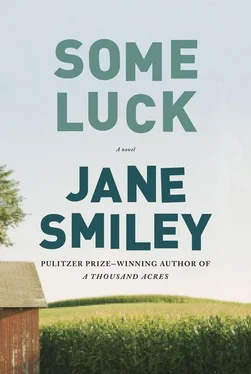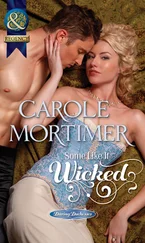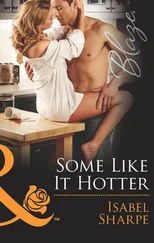She handed the second shirt to Eloise, who said, “Why did you make six loaves?”
“I said I would make three for Mama, because she’s sitting with Aunt Rose this week and doesn’t have time to make her own.”
“Is Aunt Rose going to get well?”
Rosanna looked at Eloise and put her hands on her hips, then said, “No,” because if Eloise was going to ask so many questions then sometimes she had to get a straight answer, didn’t she?
“Is she going to die?”
“If she’s lucky, since she can hardly breathe and hasn’t left her bed for a year.”
“Even to go to the bathroom?”
“Eloise, I don’t know.”
“Why not?”
“Goodness, Eloise, you sound about eight, and you’re fifteen.”
“Oh.”
“Aunt Rose is sixty-eight. She’s had a hard life, and her husband left her to go play baseball or something, down in Des Moines, and she never got over it, and that’s all I know. I’m sure Mama will have plenty to add the next time we see her.”
“Can I take Frankie out? It’s not that cold. We can walk down the road and look for wildflowers.”
Rosanna picked up the stack of folded clothes and set them in the laundry basket. They smelled starchy and fresh. She said, “That’s fine. I saw some bluebells when I was out there yesterday.”
She turned toward the stairs. Now she could hear him calling her by name—“Mama! Mama!” The very sound of his voice made her want to set down the laundry basket and run to him, but she maintained her dignity because Eloise was right behind her.
ELOISE WAS THERE at Thanksgiving, and she was looking at Frankie the very moment when he astounded the entire family by shouting, “One two three four five six sedno eight none tin!” Her mother ran in from the kitchen, Rosanna threw up her hands, and even Rolf, who was leaning over his plate in what Eloise considered her brother’s usual thickheaded way, looked up and laughed. Opa said, “I’ll be!” Frank became the family genius right there. Her mother remembered some aunt who could read at four, and also that Rosanna had said, “I’m very pleased to meet you, sir,” to Father Berger when she was not yet two, without any coaching at all. But one to ten at not yet two — well, that was something.
Eloise was less impressed. Now that she had been looking after little Frank for almost nine months, she knew he was far from perfect. The thing he was smart at was not taking no for an answer, but, thought Eloise, no one knew that, because no one ever said no to him other than herself. Rosanna said, “I don’t think so, darling,” or “Maybe later, Frank, honey,” and then Frank wheedled and nodded until Rosanna thought he was so cute that she gave him whatever he wanted, and then she told everyone what a happy and agreeable baby he was. When Eloise said no to him (“No, I will not give you my spritz cookie,” for example), Frank opened his mouth and screamed. Then Rosanna came running up the stairs and said, “Why is he screaming?” and before Eloise had a chance to answer, she swept Frankie into her arms and said, “All right, baby. All right, Frankie, let’s go downstairs and let Eloise finish her studying.” Of course, Frankie didn’t get the cookie, but he did get something better, Eloise thought, since Rosanna was still nursing him, just the way her mother and Aunt Helen had nursed every one of the children except Eloise (“She weaned herself at nine months. I never will understand that child”) until the next one came along.
Frank didn’t ask Walter for anything at all. He sometimes looked at Walter, and he laughed when Walter sat down on the floor and played with the jack-in-the-box and the drum. Or he rode on Walter’s shoulders or hung upside down over Walter’s arm and laughed, but Eloise could see that Frank was a little afraid of Walter, as who wouldn’t be, loud as Walter was.
Every day, Frank attempted with Eloise what worked so well with Rosanna — talking. Just today, when Eloise picked Frank up from the puzzle he was looking at (and chewing on the pieces, not putting it together, where was the genius in that?) to put him in his bed for his nap, he had cried and reached for the puzzle, trying to get down. “Time for a nap,” said Eloise. Rosanna was in the kitchen making her pumpkin pies, so there was no help for him.
“Puz!” barked Frank.
“After your nap,” said Eloise.
“Puz! One puz!” said Frank, now not crying, but looking at her.
“No,” said Eloise.
“One!” said Frank.
“No,” said Eloise.
And here was where Frank arched his back and had a tantrum, because Rosanna was always so charmed by Frank saying “One puz!” or “Little later!” that she gave in, and let him have one more minute with the puzzle or ten more minutes before bed. It wasn’t at all like living at home with her brothers, who at fourteen, ten, and seven were so used to “no” that, even as their mother was opening her mouth to respond to any request of any kind, Kurt, John, and Gus were making big silent “no”s with their mouths. And then, when Ma spoke, they all laughed and she wondered why.
Eloise’s own view was that there was no reason to ask. Years of watching Rosanna, who couldn’t help chattering on about all her plans, so that Ma had to have some opinion or other, and Rolf, who just did what Papa told him had to be done, showed Eloise that if you simply went about your business, no one interfered with you, especially in a house where there were six children, sometimes an aunt or a cousin living in, a hired man or two from the old country, and Oma and Opa in and out. You did your assigned tasks in a somewhat ostentatious manner and asked questions until they got fed up with you, then you went behind the corn crib and read your book or drew your picture. And then you put what you were doing under your mattress, and no one ever asked you about it. It was the same at school. If you raised your hand enough times in the front row, they sat you in the back, almost behind the woodstove, and you could finish your work (which was always easy) and go on reading the book you had brought in your schoolbag, entitled Miss Lulu Bett (a book that her friend Maggie had bought in a store down in Usherton). She and her friends had all sorts of publications that the adults knew nothing about, including another book called Tom Swift and His Electric Rifle and a very fat one called Little Dorrit , though none of the girls had been able to get through that one yet. They had copies of Adventure magazine; The Delineator , which had nice dress patterns that Eloise liked to look at; and four issues of McCall’s . Each of the girls kept a diary — Maggie had gotten them notebooks, and they had sewn covers out of canvas. Eloise’s was tan, with blue embroidery. What, she thought, was so special about a child who could say ten words in a row, just because they had been said to him over and over (as in “One two three four five six seven eight nine ten, ready or not, here I come!”)? But now her own mother, the great naysayer, was kissing him all over, and everyone was laughing, and Opa said, “ Ja , maybe he’s smart enough not to buy himself a farm, what you think?”
Everyone laughed as if this were a joke. Eloise thought, “I’m smart enough for that.” She glanced at Rolf, who was eating his goose as if he hadn’t a thought in the world. Eloise thought, “But Rolf isn’t.” She picked up the spoon for the mashed potatoes, and served herself another small helping.
“HE ISN’T yet two,” said Mama, holding him a little more tightly.
“Ah, he’ll like it,” said Papa. “Never saw a nicer horse than Jake. You’ve been on him. I’ve been on him. Here, Eloise, climb on the feed trough there, and show Rosanna.”
Читать дальше












